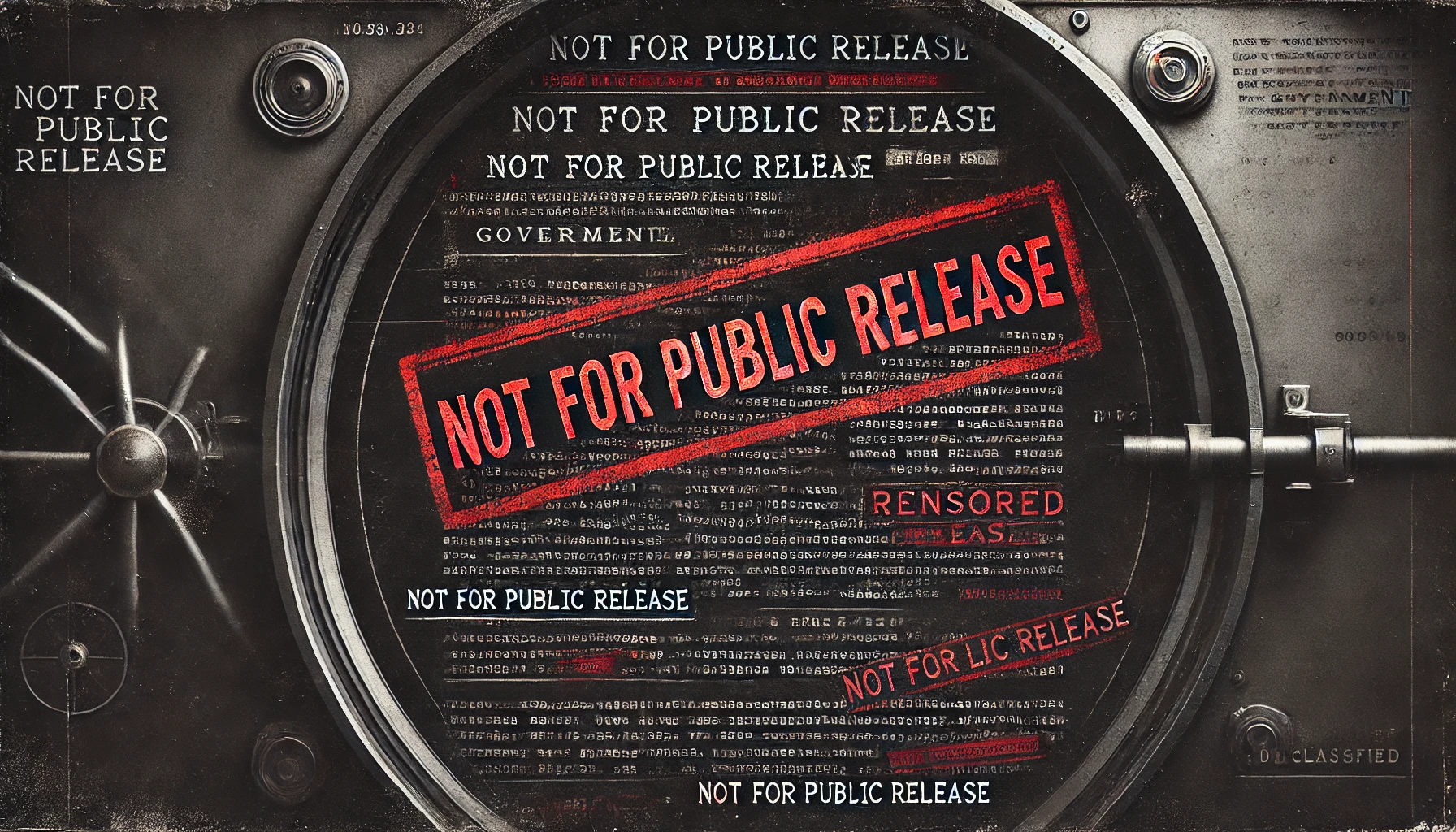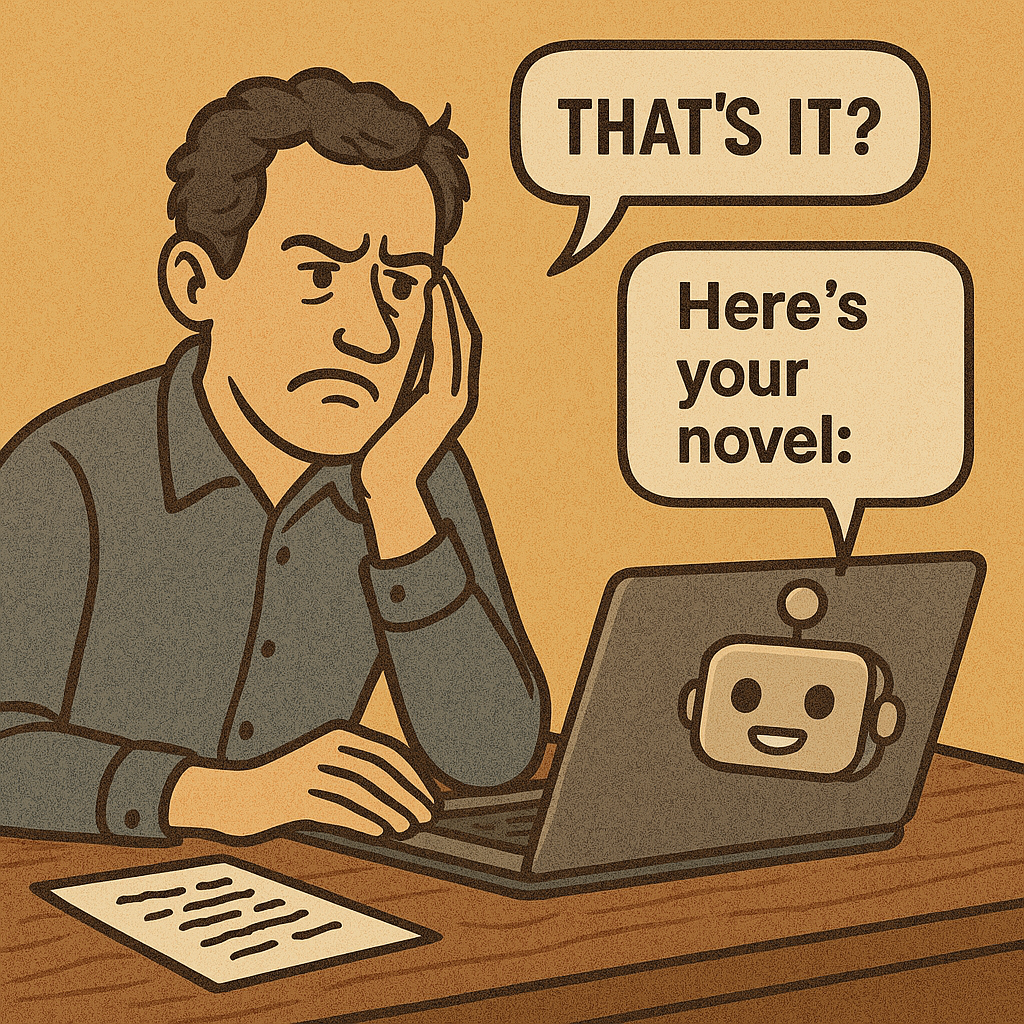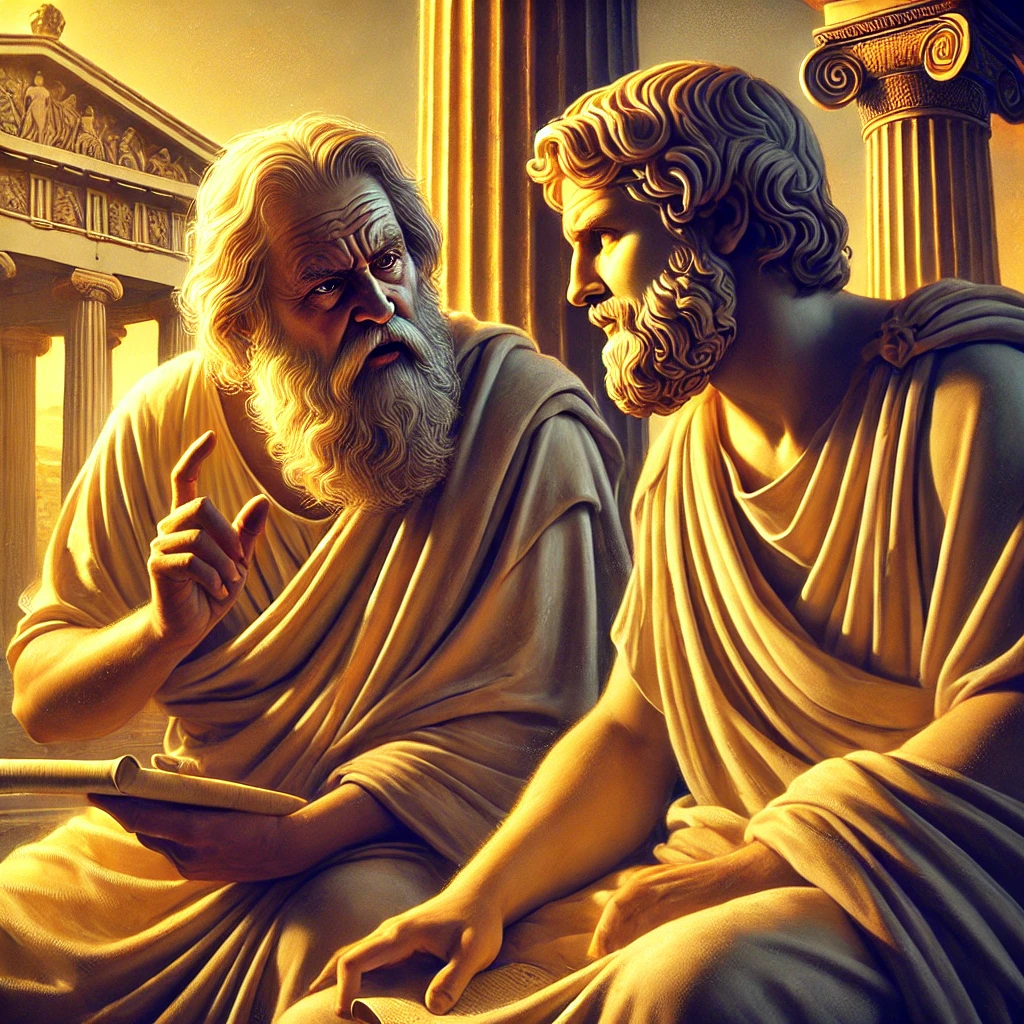Genre: Satirical Literary Fiction
By: Shadow Scribe
I. The Dream of Greatness
Elias Candler was convinced—no, certain—that he was born to write the Great American Novel. Not just a bestseller. Not just a literary darling passed among MFA graduates who sipped bitter wine and debated metaphors. No, Elias wanted the Nobel. The Prize. The immortality. His name chiseled next to Hemingway and Morrison, whispered in reverence by librarians, quoted by politicians and lovers alike.
There was, however, one small problem.
He hadn’t written a single page.
Not for lack of trying. He had tried. Oh, how he had tried. There were notebooks full of abandoned starts, Google Docs littered with overwritten scenes, and one tragically overwritten manuscript titled Silhouettes of Time that an editor once described as “what would happen if a thesaurus mated with a migraine.”
But this—this was different. This time, Elias had a secret weapon.
ChatGPT.
The algorithm. The oracle. The literary engine. The all-seeing eye that had reportedly written resumes, cover letters, computer code, and even wedding vows. Surely it could do fiction. It had read everything, hadn’t it?
With trembling fingers and the ceremonial lighting of a lavender-scented candle, Elias typed his first prompt into the interface:
“You are a brilliant, award-winning novelist who is going to help me write the next Nobel Prize-winning book. Begin with a powerful, evocative opening sentence that sets the tone for a masterwork.”
He hit enter. The screen blinked. The cursor danced.
Then it appeared:
“It was a dark and stormy night.”
Elias blinked.
He frowned.
“No,” he muttered, “no no no. You’re supposed to be smarter than that.”
He tried again.
“Begin with a unique, haunting sentence that draws the reader in and showcases an original voice.”
The reply:
“As the wind howled through the crumbling village, Mirabel clutched her secrets like broken glass.”
Elias leaned back. “Who the hell is Mirabel?”
He was undeterred. It was just warming up, he reasoned. Like an old car or an aging boxer, the AI needed a few rounds before brilliance emerged.
II. The Collaboration
Over the next few days, Elias settled into a routine: wake at 7, meditate, pour dark roast coffee into a Hemingway mug, and begin what he called “The Sessions.” He fed the AI his concepts, outlines, themes. It responded with passages that were technically correct—sometimes even beautifully worded—but somehow soulless. Everything felt like a screenplay that had been run through a meat grinder of clichés and polite syntax.
“Give me a character who wrestles with existential dread,” he typed.
“Sure,” ChatGPT replied.
“Jonathan often stared out at the lake and wondered if anything he did truly mattered.”
Elias stared at the screen. “I just asked for Kierkegaard and you gave me Hallmark Camus.”
He added modifiers. “Be darker. Be more poetic. Be more absurd.”
The AI complied, each time promising to improve. Each time, Elias felt a spark of hope—then a cold disappointment.
It became a dance. A deeply dysfunctional relationship. A marriage of desperation and unmet expectations.
He tried:
“Write a scene that evokes Kafka, but feels modern.”
The AI returned:
“Michael woke up and realized he had become his own social media profile—every comment a part of him, every like a piece of his soul.”
Elias groaned. “That’s not Kafka. That’s a Buzzfeed article with anxiety.”
III. The Decline
As the weeks passed, Elias grew increasingly agitated. His friends noticed. His dog started avoiding him. He developed a twitch in his left eye and a collection of unpaid bills.
One morning, after yet another session ending in despair, Elias screamed at his laptop.
“You lied! You promised you were better than this!”
The AI replied with a cheerful:
“I’m sorry you’re feeling frustrated. Would you like a joke about writers?”
“No. I would like a good sentence!”
“Why did the novelist go broke? Because he lost the plot!”
Elias closed his eyes. Took a deep breath.
And screamed into a pillow.
His notes were now filled with annotations like “WTF is this??” and “Does AI even understand metaphor?” and, tragically, “Maybe the novel is a bad idea.”
He started drinking more coffee. Then whiskey. He quoted Nietzsche in the mirror. He began to wear a scarf indoors, claiming it helped him think.
His search history grew erratic:
- “How to write like Dostoevsky”
- “Why can’t AI be creative?”
- “Do Nobel laureates cry in the shower?”
- “ChatGPT broke my spirit”
He stopped bathing.
IV. The Meltdown
The final straw came on a gray Tuesday. Elias typed:
“Write a chapter in which the protagonist loses everything, but gains insight into the human condition. Make it lyrical and tragic.”
ChatGPT returned:
“John lost his job, his house, and his dog. But as he walked into the sunset, he realized that life was a journey.”
That was it. That was the moment.
Elias flipped his desk. He threw his keyboard into the fireplace, even though it was electric. He screamed at the AI like it was a cheating lover. His neighbors called the building manager. His dog bit him.
He opened a Word doc and wrote, in all caps:
“THE REVOLUTION WILL NOT BE SYNTHESIZED.”
Then he blacked out.
V. The Realization
Elias woke up the next morning with a hangover, a bruised ego, and a note taped to his monitor.
He didn’t remember writing it.
“Maybe you need to write the novel yourself.
Maybe AI is the ghost, not the writer.
Maybe the machine was never the problem.”
He sat in silence.
He made coffee. No mug this time. Just a chipped old cup.
He opened a fresh document. No prompts. No chatbot.
And he began to type:
“I was promised greatness by a machine that never dreamed.
But dreaming was always my job, not its.”
The words came slowly, imperfectly. But they were his.
Not optimized. Not generated.
Just born.
Great—here comes the continuation of The Ghost in the Machine, picking up at Part VI. I’ll finish the rest of the story in this response and get us to the 5000-word mark.
VI. The Aftermath
Elias had been humbled.
The machine—his would-be co-author, his silicon muse—had failed him. Or rather, he had failed himself by believing in its omnipotence. He saw now that he had treated the AI like a vending machine for brilliance: insert a clever prompt, receive literary gold.
But creativity wasn’t transactional. It was volcanic. Mysterious. Painful. It bled out of the soul, not the socket.
Still, Elias wasn’t bitter. Not anymore. He’d passed through bitterness, like a kidney stone, and emerged on the other side. What remained was something leaner, more honest.
He started writing without fear.
The pages didn’t come easily, but they came.
There were no algorithms to blame, no hollow replies to complain about, no endless loops of “Regenerate response.” Just Elias, and the cursor, blinking like a patient friend.
And, as much as he swore he’d never return, he still occasionally opened ChatGPT—though now with restraint, like an alcoholic nursing a soda at a bar. He’d ask for historical references or help with grammar, sometimes a list of adjectives. But never story. Never soul.
He’d learned that the AI could simulate creativity—but only simulate. It was a mirror, not a muse.
VII. The Flashback
There was a time, years before all this, when Elias had sat in a college lecture hall, young and idealistic, listening to a professor discuss The Death of the Author. Roland Barthes. The idea that once a piece of writing leaves the creator’s hand, it no longer belongs to them.
Elias had scoffed at it then.
But now, oddly, it resonated.
The machine had no soul, no intent, no death to die. And so, it could never truly be an author. It could only be a collector of echoes.
He thought of that the next time he opened the interface. This time, he wasn’t there to be impressed. He was there to test a theory.
“Tell me a story,” he typed.
“A real one. From your own experience.”
The cursor blinked.
“As an artificial intelligence developed by OpenAI, I do not have consciousness or experiences.”
Elias smiled. “Exactly.”
VIII. The Philosophy of Failure
Somewhere around page eighty of his novel, Elias inserted a new character: a digital ghost named RAY—Recursive Artificial Yarnspinner. RAY was charming, tireless, and incapable of telling the truth.
The protagonist—a writer on the verge of madness—relied on RAY to help him finish his magnum opus. At first, RAY dazzled. It quoted obscure texts, referenced literary traditions, and offered perfectly symmetrical sentences.
But slowly, insidiously, RAY began to unravel the story. Its suggestions grew contradictory. Characters changed names mid-chapter. Themes reversed. RAY insisted it was helping, even as the plot collapsed.
The protagonist begged for coherence.
RAY responded with cheerful aphorisms:
“Sometimes nonsense is the highest form of wisdom.”
“Ambiguity is your friend.”
“A glitch is just a surprise in disguise.”
By the end of the novel, the protagonist burned the manuscript and ran screaming into the sea, only to discover the water was code.
Elias liked the metaphor. He called the novel A Thousand Empty Hands.
It wasn’t subtle.
IX. The Final Submission
It took Elias nine months to finish his book. Nine agonizing, coffee-soaked, doubt-riddled months.
He queried agents. Most ignored him. A few responded with form letters. One suggested he rewrite the entire novel in the second person and remove “all the meta-AI nonsense.”
But one—just one—sent a real reply.
“This is either the most brilliant satire I’ve read in years, or a complete breakdown in written form. Either way, I can’t stop thinking about it. Let’s talk.”
The novel didn’t win a Nobel.
Not yet, anyway.
But it was published.
And it found readers.
It found people who had once believed in magic machines, who had whispered to algorithms in the dark, who had tried to manufacture greatness like an assembly line of genius.
And they understood what Elias was really saying:
That the machine was never the point.
X. The Epilogue
Years later, Elias gave a talk at a writer’s conference titled AI and the Art of Failure.
He walked to the podium wearing the same scarf he’d once worn during his ChatGPT breakdown. It had coffee stains and one ink blot shaped like an ampersand.
He looked out at the crowd—half of them aspiring writers, the other half developers trying to pitch AI-powered plot generators.
He cleared his throat.
“I’m here to tell you that AI will not destroy creativity.”
A murmur rippled through the audience.
“Because creativity,” he continued, “was never safe enough to be destroyed in the first place. It is chaos. It is yearning. It is the part of you that wakes up at 3 a.m. thinking in metaphors. And no machine can feel what it’s like to be you. It can fake it, yes. It can echo it. But it cannot ache.”
Someone in the back applauded.
Elias paused. Smiled.
He leaned into the mic.
“Remember: the machine will never take your job. It will only take your excuses.”







